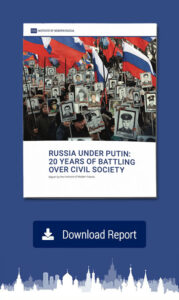Russia’s civil society remains vibrant, despite organizations’ vulnerability to restrictive regulations and funding schemes designed to foster closer integration with state agencies, says a new report.
Vladimir Putin’s regime has divided Russian civil society organization into “good” and “bad” actors, seeking to promote some as partners of the state and frame others as a security threat, according to the latest in the “Russia under Putin” series from the Institute of Modern Russia. The most prominent trend of the last twenty years has been increasing state control over civil society organizations motivated by suspicion of non-state influences over society.
At least 29 nonprofits have been designated “undesirable” and 188 have been labelled “foreign agents,” the report adds.
 Although on paper Russia seems to have as large a civil society sector as other post-communist states, in reality official government statistics fail to accurately capture the number of civil society organizations operating today, the report states. Too many organizations fall under the umbrella of “nonprofit” under Russian law, and incomplete or unenforced reporting requirements mean that only a fraction of the officially registered organizations are actually active. Data inconsistencies within existing reports on civil society organizations produced both by Russian and international monitoring groups further complicate efforts to quantify the sector.
Although on paper Russia seems to have as large a civil society sector as other post-communist states, in reality official government statistics fail to accurately capture the number of civil society organizations operating today, the report states. Too many organizations fall under the umbrella of “nonprofit” under Russian law, and incomplete or unenforced reporting requirements mean that only a fraction of the officially registered organizations are actually active. Data inconsistencies within existing reports on civil society organizations produced both by Russian and international monitoring groups further complicate efforts to quantify the sector.
The report details how different types of civil society groups have responded to repressive legislation, continuing to raise awareness of socio-political issues and representing the interests of their constituencies. RTWT
The Institute of Modern Russia (IMR) and Center for European Policy Analysis (CEPA) hosted a virtual discussion (above) following the release of IMR’s new report titled “Russia under Putin: 20 Years of Battling over Civil Society.” Participants include civil society researcher Yana Gorokhovskaia, Miriam Lanskoy (Senior Director for Russia and Eurasia at the National Endowment for Democracy), Denis Volkov (Levada Center), and Edward Lucas (CEPA). IMR’s Olga Khvostunova moderated.







